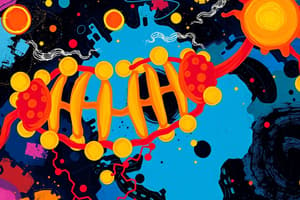Podcast
Questions and Answers
What type of structure is observed at the electron microscopy (EM) level for ribosomal RNA?
What type of structure is observed at the electron microscopy (EM) level for ribosomal RNA?
- Cylindrical structure (correct)
- Flat plate structure
- Granular structure
- Thread-like structure
Which component is present in all cells except mature blood cells?
Which component is present in all cells except mature blood cells?
- Diverse protein subunits
- Proteins
- Ribosomal RNA
- Globular α- and ß-tubulin (correct)
How are ribosomal RNA granules identified at the light microscopy (LM) level?
How are ribosomal RNA granules identified at the light microscopy (LM) level?
- Basophilic cytoplasm staining with basic dyes (correct)
- Basophilic cytoplasm staining with acidic dyes
- Large visible granules through light
- Clear structures with no staining
What type of subunits compose tubulin?
What type of subunits compose tubulin?
What characteristic do all the structures mentioned share in terms of visibility?
What characteristic do all the structures mentioned share in terms of visibility?
What is primarily synthesized by polysomes in the cell?
What is primarily synthesized by polysomes in the cell?
How many ribosomes can typically cluster to form a polysome?
How many ribosomes can typically cluster to form a polysome?
What structure do polysomes form with the aid of mRNA?
What structure do polysomes form with the aid of mRNA?
What is the bonding element that holds ribosomes together in a polysome?
What is the bonding element that holds ribosomes together in a polysome?
Why are polysomes important for a cell's function?
Why are polysomes important for a cell's function?
What type of dyes are used to stain basophilic cytoplasm?
What type of dyes are used to stain basophilic cytoplasm?
What is observed at the electron microscopy (EM) level in basophilic cytoplasm?
What is observed at the electron microscopy (EM) level in basophilic cytoplasm?
What constitutes the small electron-dense granules in basophilic cytoplasm?
What constitutes the small electron-dense granules in basophilic cytoplasm?
Which characteristic is NOT typically associated with basophilic cytoplasm?
Which characteristic is NOT typically associated with basophilic cytoplasm?
Which of the following statements about basophilic cytoplasm is false?
Which of the following statements about basophilic cytoplasm is false?
What is the primary structural unit that forms a microtubule?
What is the primary structural unit that forms a microtubule?
How many protofilaments are typically bundled together to form a microtubule?
How many protofilaments are typically bundled together to form a microtubule?
Which of the following statements accurately describes the arrangement of protofilaments in microtubules?
Which of the following statements accurately describes the arrangement of protofilaments in microtubules?
What kind of subunits compose each protofilament in a microtubule?
What kind of subunits compose each protofilament in a microtubule?
What is the overall shape of a microtubule?
What is the overall shape of a microtubule?
What structure is formed by microtubules during cell division?
What structure is formed by microtubules during cell division?
Which of the following is NOT a component derived from microtubules?
Which of the following is NOT a component derived from microtubules?
Which of the following structures is associated with microtubules?
Which of the following structures is associated with microtubules?
During which cellular process do microtubules play a crucial role?
During which cellular process do microtubules play a crucial role?
Which of the following is a result of microtubule assembly in a cell?
Which of the following is a result of microtubule assembly in a cell?
Flashcards are hidden until you start studying
Study Notes
Ribosomes
- Composed of proteins and ribosomal RNA (rRNA)
- Found in all cells EXCEPT mature blood cells
- Too small to be seen at the light microscopic level
- Basophilic cytoplasm stains with basic dyes
- At the electron microscopic level appear as small electron dense granules
- Ribosomes are composed of small and large subunits
Microtubules
- Composed of diverse proteins and globular α- and β-tubulin subunits
- Found in all cells
- Too small to be seen at the light microscopic level
- Basophilic cytoplasm stains with basic dyes
- At the electron microscopic level appear as electron dense cylindrical structures composed of 13 linear protofilaments bundled parallel to form a cylinder
- Each protofilament is made of alternating heterodimers of globular α- and β-tubulin subunits
- During cell division microtubules form the mitotic spindle
- Microtubules form the basis for several complex cytoplasmic components including centrioles, basal bodies, cilia, and flagella
Polysomes or Polyribosomes
- Are clusters of 5 to 100 ribosomes held together by a strand of messenger RNA (mRNA) to form a spiral structure
- Synthesize protein for external use (for export)
Studying That Suits You
Use AI to generate personalized quizzes and flashcards to suit your learning preferences.




